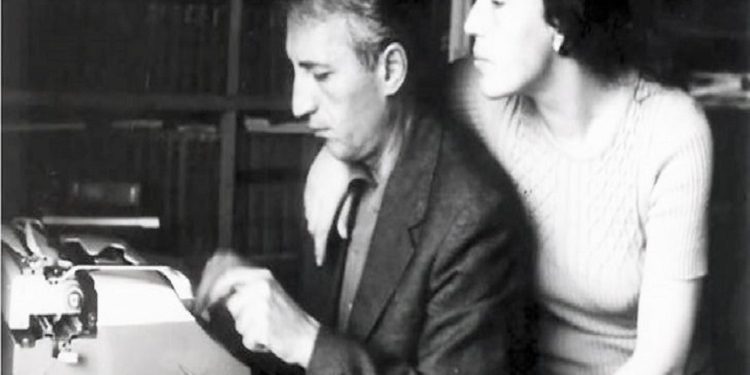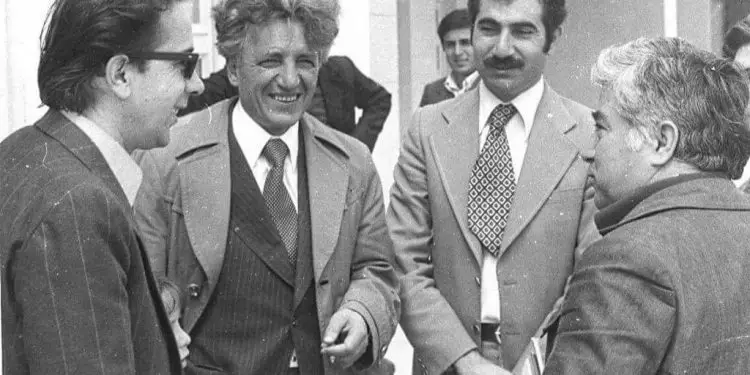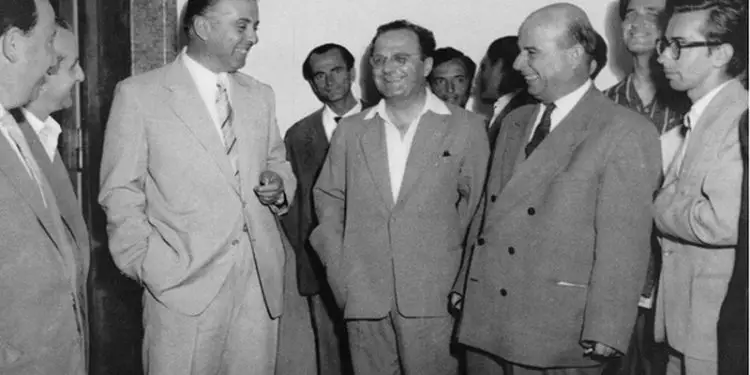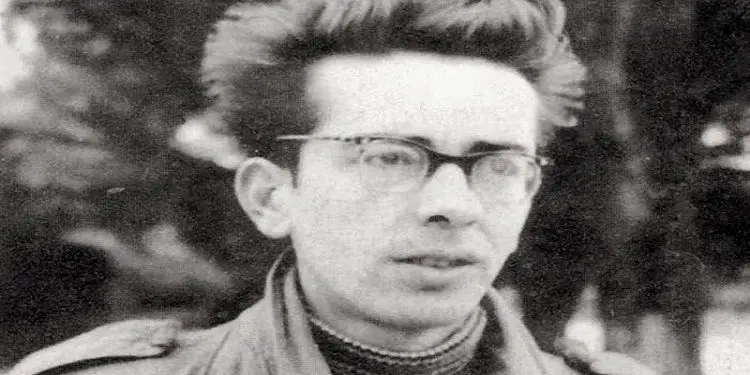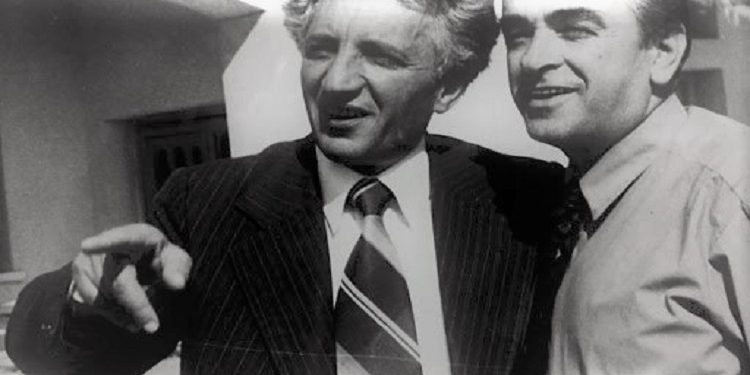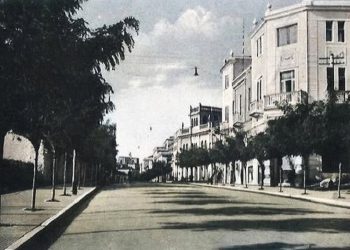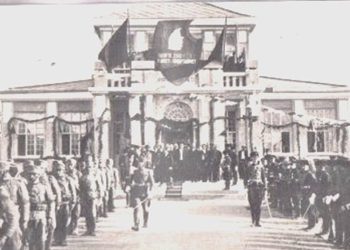By Skifter Këlliçi
Second part
– Excerpts from a historical meeting, with the participation of the dictator-
July 11, 1961, so 61 years ago…!
Enver Hoxha, although it was not announced that he would participate, suddenly came to a meeting with the intelligence of Tirana, where disturbing problems that had arisen in Albanian poetic creativity were discussed. Not only that, but from an attentive listener to the discussions of affirmed communist poets who harshly criticized young poets, who sought new paths and means of expression in poetic creativity, as well as an equally attentive listener to the answers of the latter. , strangely became a “judge” to establish peace between them. And this for reasons that will stand out in this dossier writing in some issues.
Continued from the previous issue
We find the same nuances in the erotic poetry of Fatos Arap, who writes:
“Millions of loves left in meetings /
They are walking on thin, fast heels /
Listen to their abducted knock /
Under the rhythmic clapping of light legs /
With clear joy, towards love life rend”
Exactly this new way, this poetic style that surprised the readers in the early 60’s, did not like the “poets of the older generation”, who saw in these phenomena, “obvious slippage from the traditions of Albanian poetry of that period ”.
In fact, we must say that in this case we are dealing with the continuation of the best traditions of Albanian poetry, starting from Noli, Poradeci and especially Migjeni.
This is exactly the reason that pushed the critic and poet Drago Siliqi, to publish in the beginning of 1960 an article of interest “In search of the new”, where he, addressing problems of contemporary poetry, wrote: “The form in poetry of constitutes, in the first place, the whole system of figurative synthesis used by the poet, to generalize the main features of the phenomenon he reflects. Form, in other words, is the way of expressing content and these two notions are always found intertwined with each other. The notion of form then includes the language, rhythm, rhyme, and other stylistic features of the poet.
This statement of the director of the Publishing House “Naim Frashëri” at that time, was an affirmation of the path followed by the poets Kadare, Agolli, Arapi and some others, and, although not openly, a confrontation with the old poets, who did not agree with these new directions of our poetry.
It was in these circumstances that the meeting of July 11, 1961 took place. The time had come for a great confrontation between the “old poets” and the “new poets”.
Already on them as a judge, the Party was put. She sent there the head of ideology to the Central Committee, Ramiz Alia. And this was not enough, but in the hall where this meeting would be held, Enver Hoxha himself appeared as suddenly and without remembering!
Attack of old poets: Andrea Varfi, Llazar Siliqi and Luan Qafëzezi
The prologue of the meeting was “Discussion on the decision of the Central Committee of the ALP on Literature and Arts” (June 7, 1961), published in the newspaper “Zeri i Popullit”.
In this discussion, among other things, it was written: “Treatment of positive heroes…! Writers to live as close to the people as possible. For this purpose, to use the creative permits as widely and appropriately as possible, to use the time of physical work…! Participation in long-term teams, cooperation with the press…! It is necessary to multiply the efforts of the writers and artists themselves to connect as closely as possible with the people…, to merge with the life of the people “.
These were more or less some of the main theses that Fatos Arapi mentions in his very interesting book, “I Remember I Am” (p. 63, 1997), to which we will refer several times during this cycle of writings.
The meeting of July 11, 1961, opened with the speech of Ramiz Alia, secretary of the Central Committee of the ALP. Re-treating the above theses, he focused on the new phenomena observed in Albanian poetry. “The emphasis of the paper”, – underlines Fatos Arapi in his book, “hit the youth more”. (page 71).
And when the discussions started after this speech, the first to speak were the most prominent representatives of the “old poets”, including communists. They had taken even more heart, because the paper in question opened new paths. As for the “young poets”, a heavy atmosphere was created, especially when Enver Hoxha himself and most of the members of the Politburo of the Central Committee were present in the hall.
Always based on Fatos Arap’s work, “When I Remember I Am”, I am presenting some excerpts from the discussions.
Andrea Varfi: “Being an artist of socialist realism and pursuing innovation at the same time for the sake of innovation is completely meaningless and a failed job from the beginning…
Quality and only artistic quality makes you innovative and original and not at all the acrobatics and monkeys of foreigners. The futurists, with friends, wanted to bury everything of the cultural and artistic heritage of the past. “Even today, the various isms that the imperialist bourgeoisie breeds in decay do not leave a stone unturned in this regard.”
As can be seen, the discussion carried very harsh marks and it is well understood that it was addressed only to young poets, who with their tendencies, according to Varf, were continuing even the path of the futurists.
Llazar Siliqi: “I am of the opinion that we have an innovative literature and art and there is no work left to start creating it today, without denying the further efforts that we should all make to take it even further our innovative literature and art…!
Innovative character is understood several times, on the one hand as change or more precisely as breaking of form and, on the other hand, innovation and the spirit of the time are contested where there are new words like asphalt, nylon and international themes. I think that even excessive searching of images and loading with images, when this becomes a necessary requirement for any verse, can lead to the wrong path and can make it difficult for the reader to understand.
But the poet Luan was much harsher in his discussion
Qafëzezi, who, among other things, emphasized: “In the years 1960-’61, free verses began to appear again in our daily and periodical press, but this time in a new form, more pretentious, wanting to break all the traditional norms of our metric under the pretext of a kind of “innovation”…!
The use of free verses by some poets should not be viewed as a purely formal matter, as a technical and unimportant matter. On the contrary, when used indiscriminately, it should be seen as a negative phenomenon and, if not curbed in time, can damage our poetry. It has already caused some damage. Behind this “modernization” we see a blow to the national essence of our poetry. Simply, in this kind of poetry he finds blur, without clarity, rambling and extravagant figures.
Its main theme is the international theme, the 20th century, the cosmos and others, thus moving away from the Albanian daily life, from the problems that directly concern the Party. (F. Arapi, cited work, pages 73-74-75).
Without needing to go into details, it is clear that the discussions of the above poets were tendentious, even clothed with certain wickedness. In a word, they completely denied the poetry of their new colleagues. Moreover, they did this in front of Enver Hoxha himself, convinced that he would give them the full right.
Now it was the turn of the “young poets”. They had to not only defend, but also counterattack, because, in fact, the best defense in such cases is attack. It was dangerous, but also necessary.
3
And so it happened…
Defend and counterattack: Kadare, Arapi, Agolli is missing!
“The first session of the day is over. The hall emptied and I was sitting alone and still desperate in the chair. I foresaw the danger that was threatening young people. Andrea Varfi, Llazar Siliqi and Luan Qafzezi, had said so much, but it was natural that the subtext and what was read between the written lines, was still very heavy “.
This is what Fatos Arapi writes in his book “When I Remember I Am” (page 75). It goes on to say:
“Damn this job,” I cursed myself through my teeth and got out. At the top of the hall, Nexhmia Hoxha and Fiqrete Shehu were talking in a lower voice! Then Nexhmia said to me: “Will you discuss, Fatos”? “No,” I replied desperately. “Why’? asked Nexhmia. “The party needs to hear your word.” (Thus said “yours”, which meant: “The party needs to hear the word of the youth” (p. 76).
Arapi then recounts how he met with Ismail Kadare and Dhori Qiriazi and how, having lunch in a restaurant in Tirana, they decided that the first two to discuss in the afternoon session of this meeting, which was also the last session. Fatos Arapi, remembers that Agolli was not in the meeting. It was said that he had gone to Durrës. However, as we will see, he meant his word in the article “Traditions, of course, but not prints” (Gazeta “Drita”, August 27, 1961).
I am listing below some excerpts from the discussions of the poets in question, that, though young in age, by day, not only to defend themselves, but to refute with prudent and clever arguments the misplaced accusations of the poets of the older generation.
Ismail Kadare:
The problem recently rose in the discussions and in the pages of the newspaper “Drita”, in its essence is a fictitious problem, deliberately inflated by some people. Even, apparently, these people do not care about free verses, but about the poetry of some young poets, which poetry does not accept and want to reject in any way…! The free verse is inevitably associated with us by some in the name of modernism. What if we stood up and said, starting from formalist poetry, that the more regular verses were associated with the Monarchies and flourished with all their academicism, especially near the Royal Courts? These conclusions, when you start from formalism, lead to a dead end…!
I think that in our time no form of invention has been made in our country. New content has brought us some new ways of expression, sometimes successfully and sometimes successfully. Nothing tragic has happened, no tradition has been denied, and no classic has been despised.
If art is real, it will definitely have the new, the innovative. The innovator can be even within the regular stanzas, just as the conservative can be in the middle of the free verses “. (November Magazine, 11, 1961).
Fatos Arapi in his discussion, as we shall see, went even further, revealing that the intention of the old poets to move the young poets almost into opposition was hidden:
“Often,” he said, “we are reprimanded for being ungrateful, for despising everything that has been created in us, and in particular for everything that has been created in us since liberation.” The charge, as seen, is serious. To put it bluntly, it puts young poets in anti-Marxist positions.
If someone who has made his “personal” tradition of writing weak poems, and seeks to sell this tradition to us as a national tradition, we will never accept this. Another job then if you think that, respect for him is shown by writing even weaker poems…! But it seems to me that the problem of free verse, does not arise straight…, the impression is left as if it is this free verse that separates traditionalists from non-traditionalists, classics from non-classics, the so-called modern…!
The verse is not to blame. And if anyone, by doing bad poems, has discredited himself, he has not discredited our wonderful four-syllable. This poet must understand that the broken verse did not rob him of the poetic glory he did not have…! Fortunately, the free verse came out, because some of them have someone around to make noise and show that they exist, they are alive…! (November Magazine, 11, 1961).
It is understandable that after these two discussions which seemed to be the logical continuation of each other, with clear arguments, where what was to be defended was defended, the tradition, the word with which the old poets had speculated in their discussions, trying to bring new poets to the dock, created a tense environment.
Moreover, when Enver Hoxha himself was in the presidium and the speaker was Ramiz Alia, not to mention, as we said, other members of the Politburo.
It was the first time that in a literary meeting discussions were held completely opposite to each other, which proved that the problems were very sharp. Ramiz Alia could have taken the floor to draw conclusions. But this, as events had unfolded, became difficult for him, especially since Ismail Kadare and Fatos Arapi, with their discussions, in one way or another, had opposed even the head of ideology in the Central Committee.
That is why Enver Hoxha himself stood up at the end of the meeting. By this action, he testified that he had not come to this meeting merely to greet, but to find a middle way without sedation. In short, as we said above, to become a judge between old poets and young poets.
Dictator Enver Hoxha speaks
The issue of “young” and “old” is not a problem!
This is one of the expressions where Enver Hoxha immediately emphasized that that day, I repeat, he was wearing a white suit, as if to prove that he wanted to establish understanding in this environment that was becoming hot.
And so it was. That he had read the speech of Ramiz Alia, held in this meeting, where the decision of the Central Committee of the ALP “On literature and arts” (June 7, 1961) would be discussed and he had approved it, there is no question. So that he had approved, too, the criticism that Ramiz Alia would address to young poets, even this was not in doubt.
Consequently, he might not have come to this meeting. But here he came, because he saw fit, just moments before the meeting began, when no one was expecting him.
“Comrade Andrea Varfi,” Enver Hoxha began to speak, “when he started discussing,” stressed that he likes four-syllable. I also like the octave, the ten-syllable. And when I heard Comrade Andrea’s discussion, I told him at the break that I agree with his view. Then Andrea turned to her friends and said jokingly, “Speak now if you want.” But in fact he was wrong. And the truth is that friends came out and spoke, discussed, and fiercely defended opposing views.
To be honest, except for one thing I did not like, that it turned out that the issue is raised “old” and “young”. The young, with their dynamism and liveliness, do well to shake us, the old. Therefore, I never believe that old writers and artists want to hinder the creativity of the younger ones, but they, having previously passed through these paths, are afraid that lest you rush out of the way…! But I’m convinced that you young friends… will never go astray…!
I have read some poems by Ismail Kadare. I read, for example, what he dedicated to the castle of Gjirokastra, (“Princess Argjiro”), and I liked it. I have also read other poems by Kadare, which I have liked and I have the impression that he is a talented young man. My personal opinion is that as long as your poems have Marxist content, really patriotic, mobilizing, educational and beautiful, attractive, clear form, they do not have to be disliked…! Affirm with your verse and in case the people love you, that verse is good. (November Magazine, 11, 1961).
In other words, Enver Hoxha, by confronting the “new poets” and the “old poets”, gave the right to both parties. So on the one hand he advised the old not to attack the young, but, on the other hand, a certain condition was placed on the latter that, if their poetry would be liked by the reader, whom he called the people, that poetry was valid.
In this way he “sought unity”, – notes Fatos Arapi in his book “When I remember who I am”.
Let us not forget, we are in July 1961, when nine months ago the Moscow Meeting of 81 communist parties was held, in which Enver Hoxha had come out against the political line of the Soviet revisionists and a few months later, in October of that year. year, when ideological contradictions between the communist parties of the two countries would become world-famous by Khrushchev himself at the 22nd Congress of the Communist Party of the Soviet Union. Memorie.al
The next issue follows




